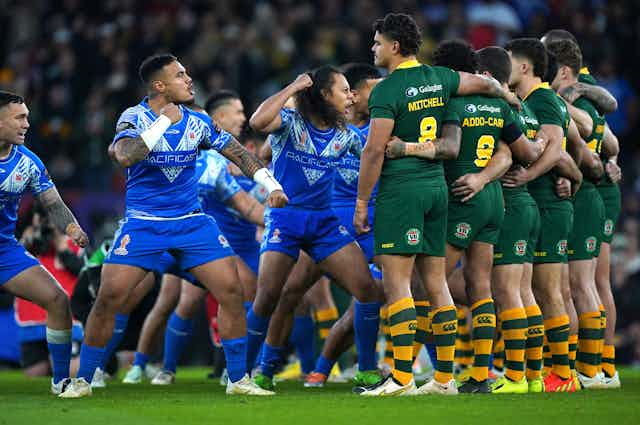With this year’s National Rugby League (NRL) season now up and running, the prevalence of Pacific players in the tournament is again obvious to see. All NRL teams now feature stars with Pacific nations heritage – indeed, it’s hard to imagine the game without them.
That pride in playing in the top leagues is now extending to which nation those Pacific players choose to represent at the international level.
In 2017, the International Rugby League (the sport’s global governing body) changed the eligibility rules, allowing players with ancestral lineage from more than one country the right to choose which nation they represent.
The ripple effect has been significant. Many Pacific players have decided to play for their motherlands. This is despite many of them being eligible to play for Australia or New Zealand, traditionally the more conventional career goal for these elite athletes.
On the field, the impact has been evident too. Last year’s Rugby League World Cup saw Toa Samoa become the first Pacific nation to reach the final. Samoa’s success built on the rise of Mate Ma’a Tonga at the previous world cup in 2017.
It has been a validation of the decision by so many Pacific players to pull on their ancestral home’s jersey – and an inspiration for younger, ambitious footballers now kicking off their own seasons at the grassroots level.

Hearts before bank balances
For many of those top players, changing allegiance during the peak of their careers has meant sacrificing the substantial monetary rewards of contracting to the Australian or New Zealand national sides.
It has also meant choosing their ancestral homeland over their country of birth. As New Zealand–born Tongan Sio Taukeiaho has said, it is a tough decision but one that involves following their hearts:
It shows how much they want to put this jersey on, and how much they want to represent their family and people back in Tonga.
Read more: How rugby league's relaxed rules for diaspora players gave the sport a new lease of life
The choice to represent that inter-generational familial legacy also highlights the role of cultural values in the arena of professional sports. As we have written about this phenomenon, “Many [players] are forced to work in an environment which privileges individual capitalism over their cultural values of service.”
One player who knows what this means in practice is Michael Jennings, former NRL star and seven-time Australian international, who chose to play for Tonga in 2017:
It’s been an honour and a privilege to represent Australia in seven tests […] I’ll always cherish those memories. But it’s a very different feeling playing for Tonga. There’s more emotion in the Tonga jersey. You know what your family has been through, and you think about them every time you put it on. We’re not representing ourselves. We’re representing our families and our heritage.

Growing the game
To put this revolution in context, at the 2022 Rugby League World Cup, 22 of Toa Samoa’s 24-strong squad would have been eligible to play for Australia or New Zealand; all but one of the Mate Ma'a Tonga squad had dual eligibility.
While not all of these players might have made the bigger nations’ national sides, of course, several notable players opted to choose their heritage nation over Australia or New Zealand, including Brian To'o, Martin Taupau, Joseph Sua'ali'i and Addin Fonua-Blake.
Read more: In both schooling and sport, Australia has slowly come to recognise its Aboriginal talent pool
In turn, high-profile Pacific players who choose to play for their homelands increase awareness of the game’s place in the Pacific, and help grow the code internationally – something commentators have long said needs to be a priority.
All of these trends within the modern game were evident in February this year, when Rotorua hosted the first NRL Indigenous and Māori All Stars tournament, featuring both wāhine (women) and tāne (men).
For wāhine Māori All Star and Parramatta Eels player Kennedy Cherrington, pulling on the Māori jersey was the “pinnacle of my career”. For tāne Māori All Star and Canterbury-Bankstown Bulldogs regular Hayze Perham, returning home to Rotorua to debut for a national Indigenous side in front of his family was a “dream come true”.
Read more: Why the winners of rugby league are not trying hard enough to expand the international game
For New Zealand-born players now based in Australia, as well as visiting Indigenous players, the tournament’s emphasis on te reo Māori (Māori language) and cultural protocols such as pōwhiri (welcoming ceremonies) can only have deepened the game’s connection to values beyond the purely commercial.
If the trend continues, and more top players make decisions based on factors other than pay and country of birth, the chances of a Pacific nation winning the World Cup will only increase. That will be cause for celebration at home, of course, but it will also be good for the game on the global pitch, now and for future generations.

